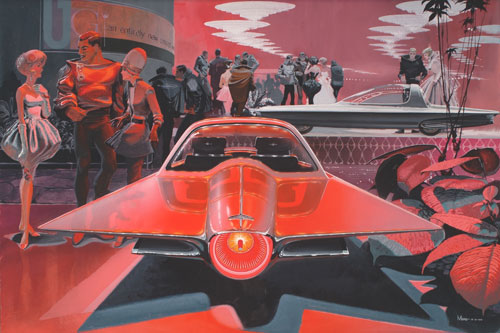Not that long ago, it was considered bold–foolhardy, even–to predict the arrival of a more technological future 25 years down the road. That was the gambit the Los Angeles Times made in 1988 when it published “L.A. 2013,” a feature that imagined the next-level life of a family of four and their robots.
We may not yet be at the point when “whole epochs will pass, cultures rise and fall, between a telephone call and a reply“–I mean, who talks on the phone anymore?–but it doesn’t require a quarter of a century for the new to shock us now. In the spirit of our age, Alissa Walker of the Curbed LA works from the new report “Urban Mobility in the Digital Age” when imagining the city’s remade transportation system in just five years. Regardless of what Elon Musk promises, I’ll bet the over on autonomous cars arriving in a handful of years, but it will be transformative when it does materialize, and it’ll probably happen sooner than later.
The opening:
It’s 2021, and you’re making your way home from work. You jump off the Expo line (which now travels from Santa Monica to Downtown in 20 minutes flat), and your smartwatch presents you with options for the final two miles to your apartment. You could hop on Metro’s bike share, but you decide on a tiny, self-driving bus that’s waiting nearby. As you board, it calculates a custom route for you and the handful of other passengers, then drops you off at your doorstep in a matter of minutes. You walk through your building’s old parking lot—converted into a vegetable garden a few years ago—and walk inside in time to put your daughter to bed.
That’s the vision for Los Angeles painted in Urban Mobility in the Digital Age, a new report that provides a roadmap for the city’s transportation future. The report, which was shared with Curbed LA and has been posted online, addresses the city’s plan to combine self-driving vehicles (buses included) with on-demand sharing services to create a suite of smarter, more efficient transit options.But it’s not just the way that we commute that will change, according to the report. Simply being smarter about how Angelenos move from one place to another brings additional benefits: alleviating vehicular congestion, potentially eliminating traffic deaths, and tackling climate change—where transportation is now the fastest-growing contributor to greenhouse gases. And it will also impact the way the city looks, namely by reclaiming the streets and parking lots devoted to the driving and storing of cars that sit motionless 95 percent of the time.
The report is groundbreaking because it makes LA the first U.S. city to specifically address policies around self-driving cars.•
Tags: Alissa Walker

